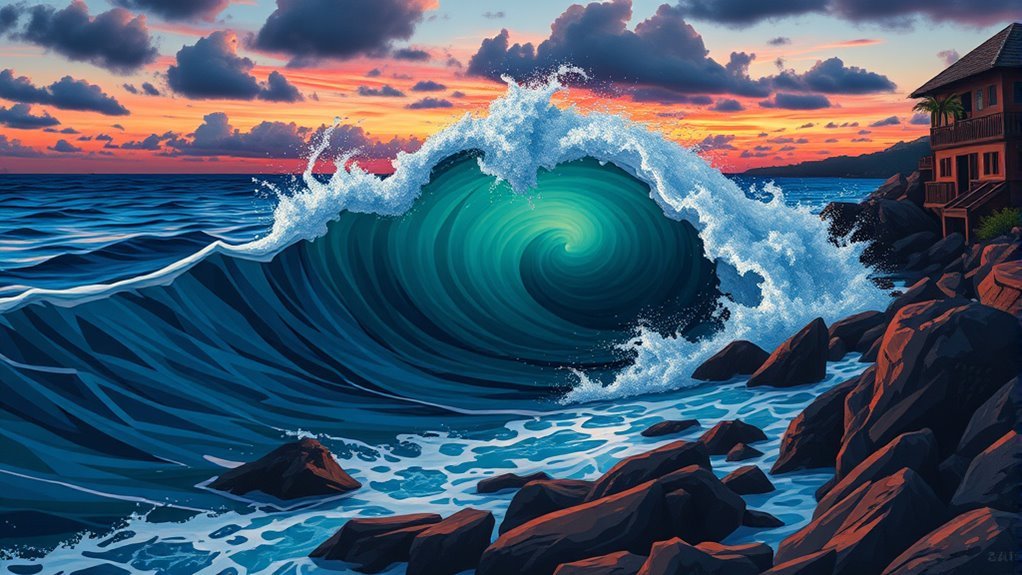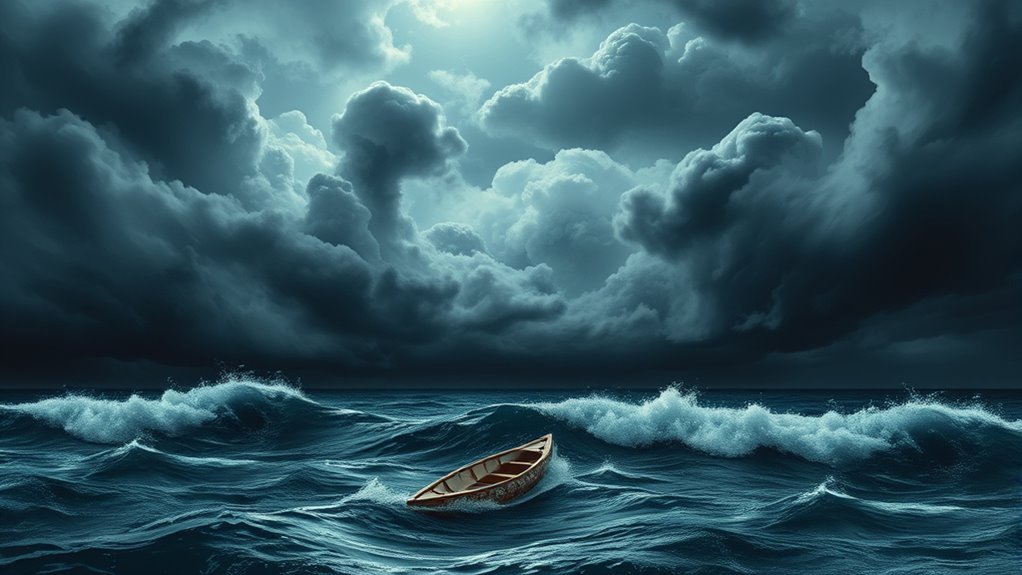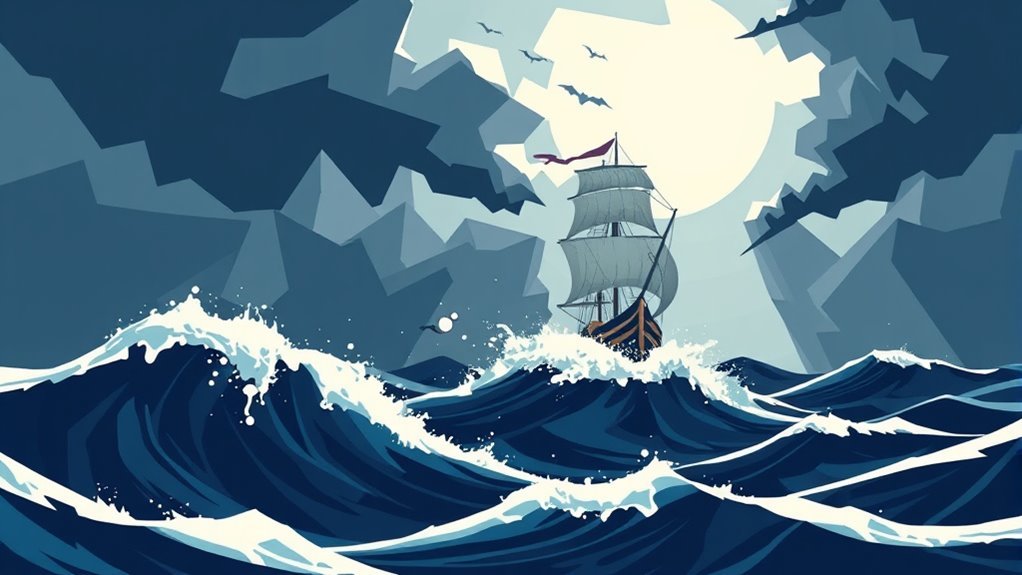Squalls hold a prominent place in maritime legends and folklore worldwide. In Caribbean culture, they are seen as testy spirits, while European tales regard them as signs of impending change. Indigenous myths often portray squalls as ancestral spirits challenging sailors' resolve. Across various traditions, squalls symbolize the complex dance between nature's fury and humanity's respect for it. This rich mosaic of stories highlights lessons of courage and flexibility amidst chaos, inviting further exploration into their enchanting narratives.
Main Points
- In Caribbean folklore, squalls are seen as temperamental spirits testing sailors' courage during their journeys at sea.
- European legends regard squalls as powerful omens, signaling disruptions and encounters with mythical creatures.
- Scandinavian traditions depict squalls as vengeful sea spirits, embodying the wrath of the ocean.
- Mediterranean cultures view squalls as cleansing forces, symbolizing renewal and the balance of nature.
- Indigenous maritime myths emphasize squalls as tests from ancestral spirits, reminding communities of life's unpredictability and the need for respect.
The Nature of Squalls: Understanding Their Formation and Impact
Squalls, defined by sudden and intense wind shifts, are a notable meteorological phenomenon in maritime environments. They often occur when warm, moist air rises rapidly, displacing cooler air, which can lead to turbulent conditions.
These atmospheric disturbances typically manifest as brief but powerful bursts of wind, accompanied by heavy rain or thunderstorms. The formation of squalls can be attributed to various factors, including frontal boundaries, sea breezes, or convectional processes.
Their impact on maritime activities can be considerable, posing risks to navigation and safety. Sailors must remain vigilant, as squalls can change the dynamics of sailing dramatically.
Vessels may experience sudden increases in wind speed, leading to capsizing or loss of control if not managed properly. Understanding squalls is essential for mariners, as they can be unpredictable yet are fundamental to the ocean's dynamic weather patterns.
Squalls in Caribbean Folklore: The Tempest and the Tide

What tales do the Caribbean's turbulent waters hold about squalls? In the vibrant folklore of the Caribbean, squalls are often personified as temperamental spirits. Seafarers recount stories of fierce winds and sudden rain, attributing these phenomena to the wrath of deities guarding the ocean. The storm is viewed as a test of courage, with sailors believed to earn favor by maneuvering through fierce squalls.
Legends also highlight the connection between squalls and the tides, illustrating the duality of nature's power. Some tales describe how squalls can bring both destruction and renewal, with calm seas following the storm often seen as a blessing.
The unpredictability of squalls serves as a metaphor for life's challenges, urging resilience and respect for the sea. Through these narratives, the Caribbean's squalls become a symbol of both danger and protection, woven complexly into the cultural fabric of island communities.
European Legends: Squalls as Harbingers of Change
Throughout European maritime folklore, squalls are often seen as powerful harbingers of change, signaling both disturbance and alteration. In various coastal legends, these sudden storms are believed to portend considerable shifts in fortune or the arrival of crucial events. Sailors recount tales of how squalls disrupted calm waters, leading to encounters with mythical creatures or the revelation of hidden treasures.
In Scandinavian lore, for instance, a squall might signify the approach of a vengeful sea spirit, warning of imminent danger. Conversely, in Mediterranean traditions, squalls are interpreted as a cleansing force, heralding the end of strife and the promise of new beginnings.
Such narratives reflect a deep connection between nature and human fate, illustrating how the unpredictable nature of squalls encapsulates the essence of life's uncertainties.
In the end, these legends weave a fabric of belief that emphasizes the transformative influence of the sea.
Indigenous Maritime Myths: Squalls in Native Narratives

In many Indigenous maritime cultures, squalls are woven into the fabric of narratives that reflect a significant relationship with the sea. These sudden storms often symbolize the unpredictable nature of life and the respect that must be afforded to the ocean.
For instance, in some Pacific Islander traditions, squalls are seen as manifestations of ancestral spirits testing the resolve of seafarers. The stories emphasize the need for humility and preparation when facing nature's fury.
In North American Indigenous myths, squalls may represent the anger of water deities, reminding communities to honor the balance between human activity and the natural world.
These narratives often serve as cautionary tales, imparting wisdom to future generations about steering through both the sea and life's challenges. Through these myths, squalls transform from mere weather phenomena into significant lessons on resilience, respect, and the interconnectedness of all living things.
Famous Squall Encounters: Sailors' Tales of Survival
Although many sailors have faced the fury of squalls at sea, a few encounters stand out as extraordinary tales of survival.
One notable story involves the crew of the sailing vessel *Endurance*, who, in 1915, encountered a ferocious squall while steering through the treacherous waters of the Antarctic. With towering waves and fierce winds, the ship was nearly capsized, yet the crew's quick thinking and teamwork allowed them to secure the sails and ride out the storm.
Another extraordinary tale emerged from the 1998 voyage of *The Albatross*, where a sudden squall struck during a fishing expedition. The captain, facing the imminent threat, managed to maneuver the vessel back to safety by utilizing the wind to their advantage, demonstrating incredible skill and resilience.
These stories reflect the unpredictable nature of squalls and the unwavering spirit of sailors who have triumphed over nature's challenges.
Symbolism of Squalls: The Duality of Fear and Respect
The symbolism of squalls reflects an intricate interplay between fear and respect for nature's power.
While these sudden storms can evoke trepidation, they also inspire awe for their raw beauty and unpredictability.
Cultural interpretations and myths surrounding squalls often underscore this duality, illustrating humanity's diverse relationship with the sea.
Nature's Wrath and Beauty
While sailors often regard squalls with trepidation, these sudden storms also evoke a deep respect for nature's unpredictable power. The duality of squalls serves as a reminder of the ocean's beauty and ferocity, reflecting humanity's complex relationship with the natural world.
This duality can be encapsulated in several key aspects:
- Fury of Nature: Squalls can strike swiftly, demonstrating nature's potential for destruction.
- Renewal: The rain from squalls nourishes the sea, nurturing marine life.
- Transience: Like life, squalls are fleeting, reminding sailors of the impermanence of calm.
- Inspiration: The dramatic display often ignites creativity in art and literature, capturing the awe of nature.
Thus, squalls symbolize both fear and appreciation, embodying the complex interplay of nature's wrath and beauty.
Cultural Interpretations and Myths
Throughout history, cultures around the world have woven squalls into their myths and stories, reflecting humanity's duality of fear and respect for these turbulent phenomena.
In many maritime traditions, squalls symbolize both the volatile power of nature and the resilience of those who traverse its challenges. For instance, sailors often regard squalls as harbingers of change, embodying the unpredictable spirit of the sea.
In some cultures, they are seen as tests of character, where overcoming a squall reaffirms a sailor's bravery and skill. Conversely, legends depict squalls as malevolent forces, evoking reverence and caution.
This duality illustrates how squalls serve as metaphors for life's unpredictability, reminding humanity of the balance between awe and trepidation in the face of nature's might.
Lessons Learned: Navigating the Sea's Unpredictability
Maneuvering through the unpredictability of the sea demands a deep respect for nature's power.
By embracing the fury of storms, mariners can develop effective strategies for survival that improve their resilience.
Such lessons, drawn from maritime legends, highlight the importance of preparation and flexibility in the face of chaos.
Embracing Nature's Fury
As sailors have long known, the sea is a domain where unpredictability reigns, often manifesting in sudden squalls that test both skill and resolve.
Embracing nature's fury offers priceless lessons in the art of navigation, reminding mariners of their place within this extensive ecosystem.
Key understandings include:
- Respect for Nature: Understanding that the sea is powerful and should be approached with humility.
- Preparation: Equipping vessels and crew with the necessary tools and knowledge to face unexpected challenges.
- Adaptability: Cultivating the ability to pivot strategies quickly in response to changing conditions.
- Community Wisdom: Valuing the shared experiences and tales of fellow sailors, which provide guidance in turbulent times.
These lessons connect deeply within maritime legends, shaping the culture of seafaring.
Strategies for Survival
While the sea can be a formidable adversary, sailors have developed a range of strategies for survival that reflect their significant comprehension of its unpredictable nature.
One key approach is the meticulous monitoring of weather patterns, enabling timely preparations for impending squalls. Experienced mariners often rely on traditional knowledge passed down through generations, such as observing changes in wind and sea color.
Additionally, maintaining a well-equipped vessel for rapid adjustments—like reefing sails or shifting ballast—proves essential in turbulent conditions. Effective communication and teamwork onboard cultivate a collaborative environment, enhancing decision-making during crises.
In the end, these strategies highlight the resilience and ingenuity of sailors, embodying a deep respect for the sea's capricious character while ensuring their safety amidst its chaos.
Common Questions
How Do Squalls Differ From Other Types of Storms?
Squalls are short-lived, intense windstorms often accompanied by sudden rain, distinguishing them from other storms, which may last longer and exhibit more gradual changes in intensity. Their rapid onset can be particularly hazardous to sailors.
What Precautions Should Sailors Take During a Squall?
When faced with a squall, sailors should secure loose items, reduce sail area, check navigation equipment, and maintain a steady course. Staying vigilant and prepared can greatly improve safety during these sudden and intense weather events.
Are Squalls More Common in Certain Regions?
Squalls are indeed more prevalent in certain regions, particularly tropical and temperate areas. Factors such as geographical features, seasonal weather patterns, and ocean currents contribute to the frequency and intensity of these sudden storms.
Can Squalls Occur in Freshwater Bodies, Like Lakes?
Squalls can indeed occur in freshwater bodies, such as lakes. These sudden, intense wind bursts may be generated by localized atmospheric conditions, demonstrating that squalls are not exclusive to oceanic environments despite their maritime association.
What Historical Events Were Significantly Impacted by Squalls?
Historical events, such as naval battles and explorations, have often been dramatically influenced by squalls. Sudden storms disrupted voyages, caused shipwrecks, and altered the outcomes of conflicts, shaping maritime history in profound ways.

